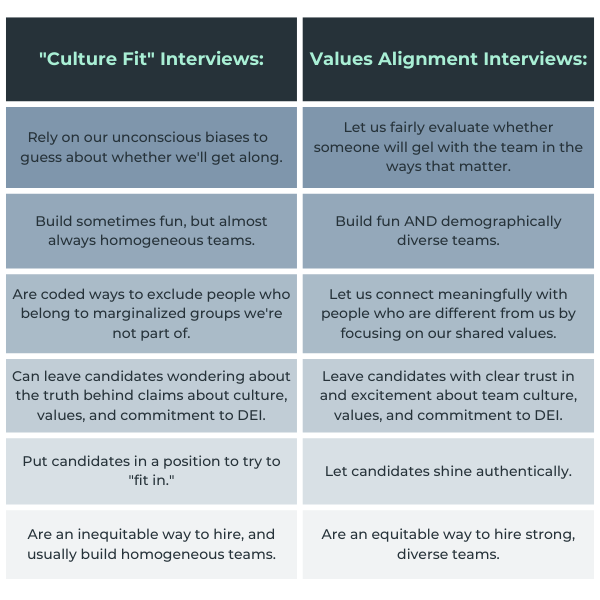The problem with “culture fit”
When you join us for our equitable hiring workshop, one of the first questions I’ll ask you is, “Raise your hand if you care about hiring people who you’ll enjoy working with.” If you don’t raise your hand, I’m probably going to raise an eyebrow. Getting along well with the people we work with makes a huge impact for most of us – for our mental health and happiness, how long we’re willing to stay with our employer, and for our work product. At the end of the day, workplace culture matters tremendously for our bottom lines.
What hiring tactics have you used to build a strong organizational culture? Before working with us, a lot of our clients tried to do this by screening candidates for “culture fit.” This usually means they were looking to get a good gut feeling when talking to a candidate. But it turns out our gut feelings are largely impacted by our unconscious biases. (This is a big part of why we wind up with homogeneous teams.) To be blunt: “We screen for culture it” is usually code for, “We let our gut instincts/in-group biases make hiring decisions for us.” This isn’t an equitable way to evaluate candidates, and is a huge roadblock to hiring strong talent and building diverse teams.
That doesn’t mean it’s a bad idea to try to hire people who will work well with your team! It just means evaluating for “culture fit” is a bad way to do it.
Our instinct to find people we get a good vibe with or feel comfortable talking to isn't bad – but it's a harmful shortcut. Ultimately, our workplace cultures are strongest when our team members share our organization’s values. And that’s something we can evaluate for fairly with a tool we developed: the values alignment interview.
Our clients love the values alignment interviews we craft with them for a few reasons:
1. Values alignment interviews evaluate for “culture fit” in only the good ways and none of the harmful ones.
Instead of using our unconscious biases to screen for “culture fit” and winding up with relatively homogeneous teams as a result, we can screen for values alignment: a candidate’s demonstrated history of and ability to work in ways that are aligned with our stated values. This allows us to create expansive cultures where our values really come to life as a shared ethos between colleagues.
2. Candidates love values alignment interviews!
We have multiple clients who have started using the values alignment interview as a core part of their “sell” strategy for candidates. Candidates who care about DEI especially love to see that you’re taking great care to build your culture in a values-aligned way. One of our client’s new hires recently shared, “As a candidate, it can sometimes feel like you have to check a certain box to be seen as the right fit. Learning about the company’s values (in the values alignment interview), and experiencing firsthand the thoughtfulness of the interview process, clarified for me that this business seeks out diversity.”
3. A values alignment interview is a tangible way to operationalize your values.
When we hosted our Ask Me Anything about Hiring day on Instagram last month, one person asked, “How do I know that what a company says about their culture is true?” I gave the answer I often give to friends who are interviewing for new jobs: ask the company how they operationalize their values!
What would you say if a candidate asked you this question? Lots of organizations have values written somewhere on their website, but very rarely do they have processes in place to hold each staff member accountable to working in ways that are aligned with those values. Having a values alignment interview not only demonstrates to candidates that your values are more than just nice looking words on your website. It sets a foundation for the processes in the rest of the employee lifecycle (especially during performance reviews) to build on.
Want to learn how to design a values alignment interview for your organization? We’ll take you through the step-by-step process in our equitable hiring workshop.

